Chops

And we know when it's present and when it isn't.
This has nothing much to do with following the score and everything to do with satisfying, even exceeding the audience's highest expectations. This is not schlock improv, nor is it simply showing off. It's more like really showing up.
Anyone experiencing an ensemble with chops holds the memory very, very, very close to their heart. It gets under their skin, and stays there.
Chops cannot be prescribed. It takes a lot of personal work to achieve it, but in ensemble performing, personal mastery isn't nearly enough. We've all heard ensembles where one performer out-performs every other, and this ain't chops. Ensemble chops requires balancing, and balancing at a higher level than any individual could achieve alone.
Wynton Marsalis claims that chops emerges from each individual finding permission to be no more (or less) than who they truly are, and then finding or forging or fomenting an honest identity together.This seems like it would be easy, but it's not. Chops is as informed by shortcomings as successes, both feed the context necessary to realize it. We too easily discount our stumbles as unrepresentative of our true potential, when they are solid representations of who we are and what we do at a particular time.
It Don't Mean A Thing If It Ain't Got That Swing is more than a Duke Ellington song. It's a fundamental fact of life.
Last night, I attended The Washington DC premier showing of the documentary
Chops, which tells the story of a high school jazz band's success in the annual Essentially Ellington competition at Lincoln Center. Their teacher was the least inspiring of those profiled. Their story was not one of unending success from inception, but one of a surprising success. One no one in the audience expected them to win until they pulled off that great, moving, memorable performance on stage. Chops! They deserved to win, but anyone would had to have been delusional to think that this group would actually rise to the occasion. But rise they did.Pivotal to their success was a brief visit from a consultant working with the Essentially Ellington foundation. He stopped in for a day and utterly transformed each member's relationship with their music, talent, and each other. When he left, those kids had soul. Before his visit, they were mere talented posers.
How does a project community get chops? Where does their soul come from? Where do they get permission, the ultimatum, to expose their true selves to achieve great things? Some claim this can't be done, except by accident. And that it almost never occurs accidently, that we need to guide and control to achieve even modest results. Interestingly, at the winning performance, the uninspiring band teacher introduced the band, then left the stage, understanding that the group's potential was far greater than he could imagine or direct.
They would succeed or fail on their own chops, which, if they could not produce themselves, could not otherwise be produced.
I'm thinking about chops. Thinking they are well within the reach of anyone, any team, any community. This has certainly been my experience as a brief consultant. Much like the Essentially Ellington consultant, after the brief intervention, people started stumbling upon their own chops. Some even accused me of inducing the result, but I fooled them. They really did it themselves after being reminded of what they could actually achieve if they really showed up, and receiving no more than small permission to do what they already knew full well how to do.
We could be better than we are, we could be swingin' on a star! (Thank you, Jimmy and Johnny!)


